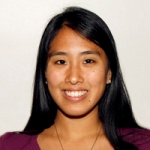Medicine from the heart . . . Serena Hon
On Thursdays, the Daily Voice showcases selected Thursday Morning Memos, reflective essays about clinical experiences written by faculty, alumni, residents and students of the Department of Family Medicine & Community Health and, occasionally, contributors from other departments. Thursday Morning Memos is UMass Medical School’s homegrown version of narrative medicine, in which the authors process their experiences through writing. To learn more, visit: http://www.umassmed.edu/news/articles/2011/personal_stories.aspx.
|
Serena Hon, MD, a first-year resident at the Hahnemann Family Health Center, wrote, "I marveled over how lucky I was to care for this family, and thought that if it were more widely distributed, it might give some of my fellow interns some hope and some more seasoned family medicine docs a smile." What more can I say—the reason for the Memo has definitely come to fruition and Serena's reflection definitely gave me a smile—Hugh Silk, MD |
 |
"You're everywhere"
SD was a sleepy little pigtailed girl with a fever and headache, who would cry without provocation and curl up in her mother’s lap, pushing away our penlights and stethoscopes. We all thought she was just another whiny kid with a virus, and a virus she did have—HSV meningoencephalitis with bleeding into her ventricles on CT. She would stay with us for almost the entire month I was on pediatrics. We would watch in amazement as she bounced back like only children can from such grave diagnoses, going for slow walks around the wards with her mom, taking necessarily tentative steps secondary to her recovery and her mother’s second-trimester pregnancy. SD was my first lumbar puncture, and although she wailed, Mrs. D held her still as I drew out 40 milliliters of cerebrospinal fluid, turbid with decomposing red blood cells.
I saw her again just a month later, completely unexpectedly, on my ambulatory women's health rotation. Sitting in the plush office of a private obstetrician, awaiting the next prenatal patient, I heard running footsteps and high-pitched giggling. Those same pigtails poked into the doorway through which I gaped and pointed, “Hey . . . I know you!”
“Hey, I know you!” SD repeated, then more pealing laughter. During her mother's visit, she was gregarious to the point of being nearly disruptive. Remembering the same wan face tucked into hospital bed sheets only weeks prior, I couldn't help but look on in amazement.
Midway through December, on my first full week of OB nights, I was fighting yawns around the "witching hour," 3 to 5 a.m., when action happens and one's response systems are too tired to focus clearly. Two multiparous women in active labor rolled into triage with nearly identical exams: eight centimeters dilated, both screaming through contractions and begging for epidurals. I recognized one of the names almost immediately, and yet, before I could process my disbelief, I found myself talking Mrs. D down from her conviction that she could never deliver without an epidural. Starting such therapy takes 30 minutes in total, and it was only about that long before SD's squirming newborn brother slid into my sterile-gloved hands. Afterwards, while gazing at her husband snuggling the latest addition to the family, Mrs. D's eyes met mine in a duet of exhaustion and relief: "Wow . . . you're everywhere."
Indeed, as family medicine physicians, we are. Those familiar with our FM residency rotation schedules know how serendipitous that chain of events was, and yet long-time FM providers might simply sit back and smile in response. Isn't this how it is meant to be, after all? I thank my specialty (and my lucky stars!) for the honor of participating in the care of these patients, through whatever obstacles, miracles and mundane details write the stories of their lives.